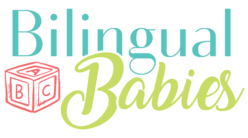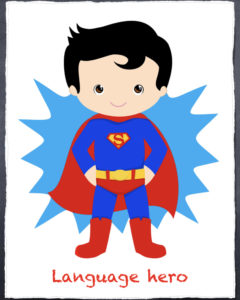Barbara is a teacher of English, Spanish and German. Originally from near Rothenburg o.d.T., Germany, she moved to the United States in 2016. Her husband, who speaks German as well, is from Minnesota. When Barbara became the mom to a little girl, she started writing about bilingual living with German and English. In this interview, she is sharing many of her insights from being a language teacher and mom.
Location: USA
Parents: Mom=German, English; Dad=English, German
Children: Daughter (9 months) = pre-language
———————————————————————————————————————
Veronika: Many thanks for taking the time for the interview. My first question for you is: What languages do you speak at home, or who speaks what to whom?
 Barbara: My husband and I usually speak English with each other. My husband speaks English with our daughter, and I speak German with her, only German. So we do one-parent-one-language (OPOL).
Barbara: My husband and I usually speak English with each other. My husband speaks English with our daughter, and I speak German with her, only German. So we do one-parent-one-language (OPOL).
Veronika: How old is your daughter now?
Barbara: She is 9 months as of yesterday.
Veronika: And does your husband speak German too or does he understand German?
Barbara: He does. He did a study abroad year in Karlsruhe and is fluent in German. So, every once in a while, he switches to German and speaks German to our daughter, which, I guess, is fine. If it were the other way around—me switching to English—I would be a little bit more concerned since we live in the U.S.. But it’s fine and I’m pretty sure that even though German is the majority language right now for us, it will even out later on.
Veronika: Yeah, it’s actually going to help because English is going to take over at some point for her. By the way, has she already started speaking yet, or do you notice anything in terms of her understanding what you say?
Developing speech and language skills
 Barbara: Over the last couple of weeks, she started making certain sounds, showing that she wants to communicate with you. She just makes a sound and then looks at you expectantly… So yes, I noticed that she actually does make different sounds when interacting with me rather than when interacting with my husband which is pretty funny. And then, the other thing we noticed is this: I’m home with her. So, she pretty much listens to German all day. And whenever my husband is home and we talk in English, she seems to notice it. Sometimes, when I talk in English in front of her, she looks very puzzled. Yeah, you can see it in her face that she’s wondering “Why is my mom talking in another language right now?”
Barbara: Over the last couple of weeks, she started making certain sounds, showing that she wants to communicate with you. She just makes a sound and then looks at you expectantly… So yes, I noticed that she actually does make different sounds when interacting with me rather than when interacting with my husband which is pretty funny. And then, the other thing we noticed is this: I’m home with her. So, she pretty much listens to German all day. And whenever my husband is home and we talk in English, she seems to notice it. Sometimes, when I talk in English in front of her, she looks very puzzled. Yeah, you can see it in her face that she’s wondering “Why is my mom talking in another language right now?”
Veronika: It’s funny how they notice these distinctions early on. Do you keep track of her language development?
Barbara: Not in written form, just what we notice.
Veronika: What’s the difference in regards to sounds she makes?
Barbara: Hm… It’s hard to explain honestly. It’s just two very distinctive sounds.
Veronika: No worries! [laughs] I guess the nerdy linguist in me always found it fascinating when there were clear patterns that indicated language development. Well, why do you want your daughter to grow up with German and English?
Language is key to keeping strong ties with family abroad
 Barbara: Well, I just moved to the U.S. in 2016. Before that, I’ve lived in Germany my whole life. I was born and raised there and my whole family lives in Bavaria, Germany. My dad doesn’t speak any English and my mom only a little bit. So, for me, German is really important. I think a big part of who I am is my German culture and that I speak the German language. And it’s just important for me that my daughter knows who I am and that I can pass that on to her and that she can communicate with her grandparents whenever we see them. And then my friends and extended family, they all speak German. So, it’s just that, family and identity. That’s the reason.
Barbara: Well, I just moved to the U.S. in 2016. Before that, I’ve lived in Germany my whole life. I was born and raised there and my whole family lives in Bavaria, Germany. My dad doesn’t speak any English and my mom only a little bit. So, for me, German is really important. I think a big part of who I am is my German culture and that I speak the German language. And it’s just important for me that my daughter knows who I am and that I can pass that on to her and that she can communicate with her grandparents whenever we see them. And then my friends and extended family, they all speak German. So, it’s just that, family and identity. That’s the reason.
Veronika: Very good points and very common ones as well. Language is a huge part of our identity, of who we are, and as an expat, it’s a way to connect with family back at home as well. So, how do you make sure to pass on your heritage? What ways do you use to expose your daughter to German other than you speaking to her on a daily basis?
Providing exposure to the minority language from day 1
Barbara: So, I read her a story in German every day around lunchtime which I have found to be actually really good. It’s just for her to listen to. Even if I talk German to her all day, it’s actually just a very simple kind of everyday language. And I feel that it’s very important for her to hear other words, words that are different from the ones tied to our daily routines. So, we read every day. And then we listen to a lot of audio books. On YouTube, there are lots and lots of resources. Songs and audio books that I listened to when I was little. For example, Benjamin Blümchen or Bibi Blocksberg. We usually listen to that during the afternoon play time. We don’t do screen time yet. Instead we read, listen to audiobooks, and she is around when I talk to friends and family. We Skype or Face Time every other day at least and always talk German. Maybe I’m forgetting something, but I think that’s pretty much it.
Where to find German books and resources
Veronika: That sounds very familiar to what I did when Ella was your daughter’s age. In terms of books, it wasn’t always easy to get my hands on German books here in the United States. Where do you get your books from? Do you bring them over from Germany?
Barbara: I have a few books which my family and friends sent me. Then there are a few bilingual books that you can order on Amazon. For example, Am I small by Philipp Winterberg is translated in 170 languages and dialects. For our lunch story time, the stories that I read are usually from online sources. There’s just so much out there; so many fun stories to read.
Veronika: Do you have any specific resources or websites you go to in order to find the stories?
 Barbara: Yeah. Usually for lunch story time, I use the website and app Einfach Vorlesen. All stories on there are categorized into three different age groups— 3, 5 and 7 years. Each story also gives an estimate reading time and they let the reader know how long the specific story will be available online.
Barbara: Yeah. Usually for lunch story time, I use the website and app Einfach Vorlesen. All stories on there are categorized into three different age groups— 3, 5 and 7 years. Each story also gives an estimate reading time and they let the reader know how long the specific story will be available online.
Veronika: Oh, yes, recently I came across that site too. It’s a nice service…by Stiftung Lesen, right?
Barbara: Yes! And they switch up stories all the time. I just choose whatever story I think is good. I don’t really go after a specific age group right now since our daughter is still little. I feel like I’m just reading to read. I mean, I don’t know how much she really understands at this point.
Veronika: Well, it’s exposure to German.
Barbara: Exactly. That’s true.
Sticking with the minority language when there are people around who do not understand?
Veronika: Okay. I know she’s still very young with 9 months. But have you encountered any particular challenges in your bilingual journey yet?
 Barbara: What I find most difficult is when we’re out and about and we’re surrounded by just English everywhere. Before having our daughter, I worked at a museum here in Michigan and everyone spoke English. When we go there now, I talk to my friends and colleagues in English, but I still want to talk to my daughter in German. That is sometimes a little bit difficult. I just feel awkward speaking another language in front of someone else. And I guess it’s the same way around in Germany. I don’t really feel comfortable speaking English. It just makes me feel strange because I feel that I’m excluding my surrounding. Whenever we’re out and about I try to explain fairly quickly to others that I’m speaking German to our daughter; it makes it a bit easier whenever I address it right away.
Barbara: What I find most difficult is when we’re out and about and we’re surrounded by just English everywhere. Before having our daughter, I worked at a museum here in Michigan and everyone spoke English. When we go there now, I talk to my friends and colleagues in English, but I still want to talk to my daughter in German. That is sometimes a little bit difficult. I just feel awkward speaking another language in front of someone else. And I guess it’s the same way around in Germany. I don’t really feel comfortable speaking English. It just makes me feel strange because I feel that I’m excluding my surrounding. Whenever we’re out and about I try to explain fairly quickly to others that I’m speaking German to our daughter; it makes it a bit easier whenever I address it right away.
How to incorporate both languages and not exclude anyone
Veronika: Yeah, that’s a good point: feeling awkward to speak a language that others around you don’t understand. I struggled with that too in the beginning. The way I do it is that I always say the German first and then repeat it in English in order to include people around us. That way, Ella has to process the German first. If I say it in English first, she’ll most likely not listen to the German anymore. That’s why I always make it a point to use the minority language first and then repeat it to include others around us.
Barbara: How old is your daughter?
Veronika: She’s 4 now.
Veronika: I’ve pretty much done that from day one that I use German even when others who do not understand are around because I also want her to know that German is not a “secret language” that only mommy speaks. It’s something that you don’t need to hide. It’s something that you can speak in front of others and you can also be proud of your German heritage. So, for me, that’s why I settled for that approach.
Barbara: That’s a good idea.
Veronika: Also, within our family, my husband doesn’t understand any German. He’s getting better. He understands gists or individual words like “brushing teeth” and “to say good night”. He can follow these regular routines, but beyond that, he’s oftentimes lost when we just speak German. So, at the dinner table, I do the same thing: German first, then repeat in English. It took some cognitive effort in the beginning, but eventually it became normal. For Ella that has worked well and she’s gotten pretty good. When she talks to my husband, she speaks English, and then she turns around and talks to me in German.
Barbara: That’s awesome.
Veronika: Sometimes I catch her repeating things for her dad in English too. So, she’s starting to mediate as well which is interesting.
Language use among siblings: majority or minority language?
Barbara: That is great. And now, there is a 2nd baby on the way?
Veronika: Yes, there is. I’m due in three weeks.
Barbara: That’s coming up quickly.
Veronika: That is certainly true! [laughs] So we’ll see how that goes and how that’s going to change the dynamic in our family. Oftentimes, it’s English among the siblings. For now, my approach is to make Ella my little “language helper”. In other words, she is my support to help the little one learn German. We will see how that goes…
Barbara: I’m sure it’ll go well.
Veronika: I’ll keep you posted…
Barbara: Please do!
Don’t compare yourself to other families—find what works for you
Veronika: Okay, the last question I have for you is: what would you recommend to other parents who are either starting their bilingual journey or are already raising children with multiple languages? What piece of advice would you give to them?
 Barbara: I think the best advice that I can give at this point is to not compare yourself with other parents and kids. I feel like ever since I became a mom, there is just a lot of pressure and comparison with pretty much everything. When is my baby supposed to roll over? When is she supposed to start solids? And I feel as if it’s just this constant and overwhelming feeling that you are missing out and you’re not doing enough. So, I would say if someone wants to raise their child bilingually, do everything at your own pace. Follow what method works best for you. There are obviously various ways to go about it. If you want to stick with it, then just try and stick with it and don’t give up even though it’s probably not going to be easy all the time. I haven’t experienced it yet, but I’ve seen it with many parents while working as a teacher. So just keep at it and don’t throw in the towel. Try to not let yourself get overwhelmed with comparing everything, but have fun with the languages too.
Barbara: I think the best advice that I can give at this point is to not compare yourself with other parents and kids. I feel like ever since I became a mom, there is just a lot of pressure and comparison with pretty much everything. When is my baby supposed to roll over? When is she supposed to start solids? And I feel as if it’s just this constant and overwhelming feeling that you are missing out and you’re not doing enough. So, I would say if someone wants to raise their child bilingually, do everything at your own pace. Follow what method works best for you. There are obviously various ways to go about it. If you want to stick with it, then just try and stick with it and don’t give up even though it’s probably not going to be easy all the time. I haven’t experienced it yet, but I’ve seen it with many parents while working as a teacher. So just keep at it and don’t throw in the towel. Try to not let yourself get overwhelmed with comparing everything, but have fun with the languages too.
Veronika: That’s a very good point because every child, every family, every bilingual journey is different. So, look left and right and see what applies to you and what you can use in your own situation. But don’t let that pressure you into a certain schedule or way to go about it. That’s a good point. All right. Thank you so much and all the best for your bilingual family!



